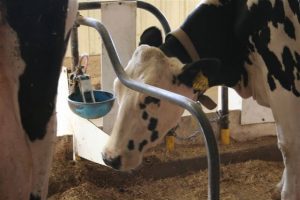 A diverse coalition of 35 organizations representing family farming, healthy food initiatives, social and environmental justice, conservation, and community-supportive agriculture is urging the U.S. Department of Agriculture and University of Wisconsin to invest anticipated federal funding in managed pasturing rather than confined animal operations.
A diverse coalition of 35 organizations representing family farming, healthy food initiatives, social and environmental justice, conservation, and community-supportive agriculture is urging the U.S. Department of Agriculture and University of Wisconsin to invest anticipated federal funding in managed pasturing rather than confined animal operations.
Senate Agriculture Appropriations Subcommittee Chairman Herb Kohl recently secured $2,502,360 for the Dairy Forage Agricultural Research Center farm in Prairie du Sac to evaluate and develop building plans to support future research needs.
Under consideration is a $27 million “intensive animal unit” that would be constructed on recently-acquired lands inside the closing Badger Army Ammunition Plant. The proposal would increase the research farm’s average herd size of 400-600 animals to as many as 1,000 animals.
A planning committee representing the U.S. Dairy Forage Research Center, University of Wisconsin Agricultural and Life Sciences, and 2 stakeholders (Agri-King and Crave Bros. Farm) recently identified a preferred 40-acre building site inside Badger near the Bluffview community on U.S. Highway 12 in the township of Sumpter.
Grazing advocates maintain that confinement systems are not environmentally sustainable or economically competitive. A recent UW cost analysis found that on 300 cows, the research farm is losing approximately $837,000 per year. USDA officials said that high state wages account for the majority of these costs. The proposed intensive animal unit is expected to increase operational costs even more.
By comparison, managed grazing has the benefit of lower initial capital investment. Much less money is invested in equipment and machinery compared to confinement systems which means greater net income per cow. Statewide, the percentage of farmers using managed grazing is increasing every year. In 2003, more than 23% of Wisconsin’s 16,900 dairy farms relied primarily on grazing.
The U.S. Dairy Forage Research Center farm operates jointly with the University of Wisconsin. The UW owns the dairy herd and employs the herd manager and most farm workers. The USDA owns the buildings, equipment, and land.
The October 16 letter to the USDA – organized by Citizens for Safe Water Around Badger (CSWAB) – was co-signed by representatives of the Madison Area Community Supported Agriculture Coalition, Family Farm Defenders, Organic Consumers Association, Madison Audubon Society, Clean Water Action Council, Peace Action Wisconsin, Sierra Club-John Muir Chapter, Concerned Citizens of Newport, Midwest Environmental Advocates, Tribal Environmental Watch Alliance, and many others.
USDA officials said that the project is still in the planning phase and that it could be several years before any construction begins.

